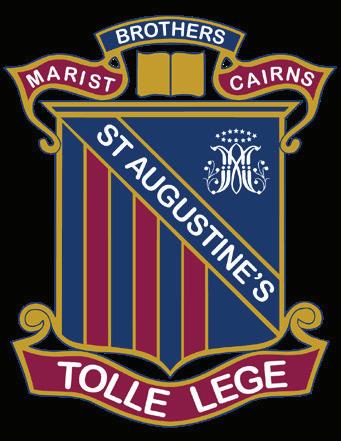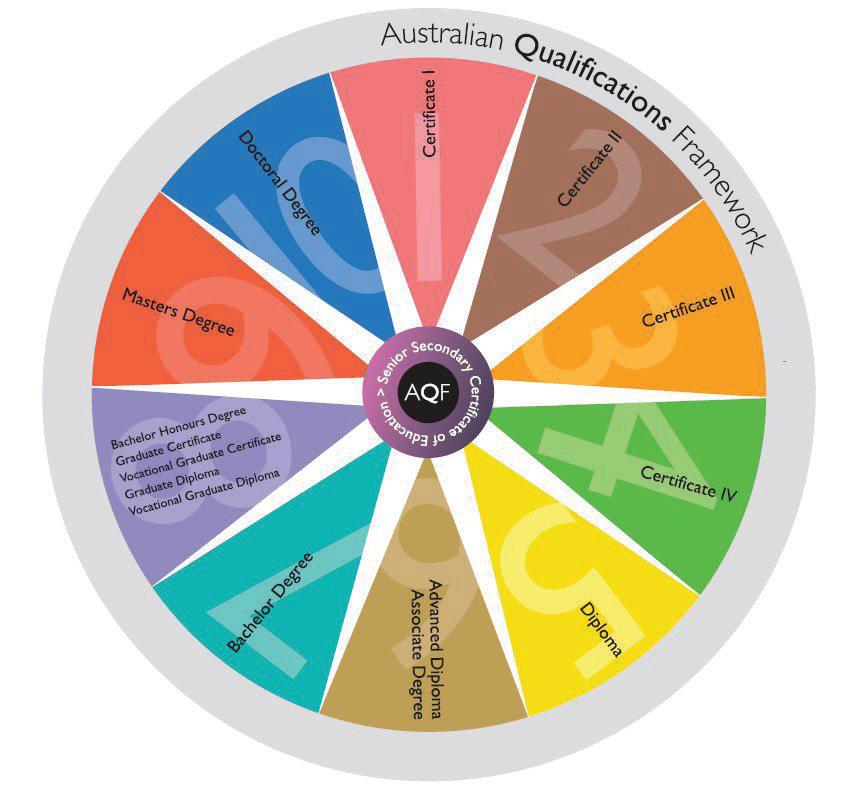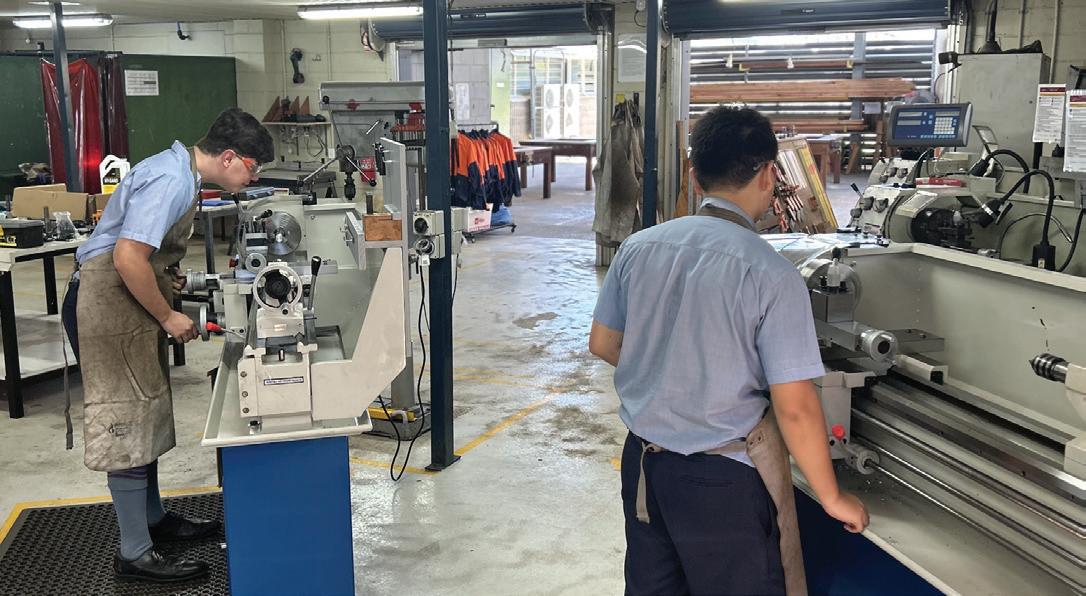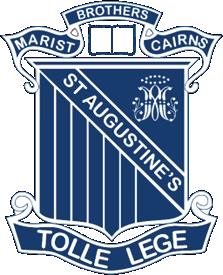










VET Coordinator
Dear Parents and Carers
Congratulations on your decision to enrol in a nationally recognised vocational course.
This handbook has been written to provide students with important information about the Vocational Education and Training (VET) qualifications offered at St Augustine’s College as well as your rights and responsibilities as a VET student.
Students should take the time to study this handbook carefully and ask their Trainer and Assessor if they are unsure of any details. Students should keep this handbook (or refer to the Student Portal) for reference throughout their enrolment.
The contents of this handbook in many instances represents the key points of various VET policies and procedures developed by this RTO.
Best wishes
HELEN LEICHT VET Coordinator
All of the VET courses offered by this RTO lead to nationally recognised qualifications – a certificate (if all of the requirements of the qualification are completed) or a statement of attainment (for those parts that are successfully completed where the full qualification is not completed). This certificate/statement of attainment will be recognised in all eight states/territories in Australia. This is because Australia has a national qualifications framework called the Australian Qualifications Framework (AQF). There are 14 different types of qualifications that can be obtained. These are shown in the following diagram.
Your Trainer and Assessor will provide you with information about your VET qualification/s including an overview of the specific units of competency/modules in each, assessment requirements, vocational outcomes, etc. The following qualifications available for completion at this RTO are listed on the Enrolment Agreement that you will be provided with and can also be viewed in the Senior Subject Selection Handbook.
Source: Australian Qualifications Framework Second Edition January 2013



Students enrolled in the VET courses at this RTO participate in the same enrolment and selection processes as other students at the RTO. Where numbers are limited for VET subjects, selection will be based on interview and/or on the order in which enrolments were received.
St Augustine’s College will provide each student with information about the training, assessment and support services they will receive, and about their rights and obligations (through the VET student induction session) before enrolment on the Student Management application.
The RTO Manager and associated Trainers and Assessors will induct all VET students with this handbook.
Information pertaining to your qualification or accredited course can be sourced from course documentation provided by your Trainer and Assessor, subject specific information included in the Senior Subject Selection Handbook, through the VET Student Handbook and on the RTO website or Student Portal.
Information available to students regarding course information will include:
> Qualification or VET accredited course code and title
> Packaging rule information as per the specified Training Package or VET Accredited course
> Units of competency (code and title) to be delivered
> Entry requirements
> Fees and charges
> Course outcomes and pathways
> Work experience requirements (where applicable)
> Licensing requirements (where applicable)
> Third party or off-campus arrangements (where applicable).
The RTO will ensure that its marketing and advertising of AQF qualifications to prospective students is ethical, accurate and consistent with its scope of registration. In the provision of information, no false or misleading comparisons are drawn with any other training organisation or training product.
The RTO will not advertise or market in any way VET accredited courses, qualifications or units of competency that are not on the scope of registration.
St Augustine’s College will ensure it will have the appropriate human and physical resources to deliver and assess any course currently on the RTO’s scope of registration. If the RTO loses access to these resources, the RTO will provide students with alternative opportunities to complete the course and the related qualification.

The RTO will observe all Australian, state and territory laws governing Vocational Education and Training. The RTO will also meet all legislative requirements of the:
> Education (General Provisions) Act 2006
> National Vocational Education and Training Regulator Act 2011
> Copyright Act 1968 (2006)
> Education (Work Experience) Act 1996
> Child Protection Act 1999
> Work Health and Safety Act 2011
> Anti-discrimination Act 1991
> Privacy Act 1988 (2014)
> Information Privacy Act 2009
If students require any further information, please see the RTO Manager.
The RTO does not charge students fees for VET services. Levies are only collected for consumable costs or other additional services such as the issuing of a replacement qualification testamur. Any fees and charges that do occur for additional services will be made known to students prior to enrolment.
Students who enrol past the commencement of the calendar year will be charged student levies at a pro-rata basis for the duration of the year. Students who leave a VET course before completion may be able to claim a refund for part of the course consumables (levy).
Fees for VET courses provided by external training providers will be charged as per the third party arrangements with that provider.
Matters regarding payment of fees or refund of fees will be managed by the Business Manager in accordance with the principles contained in the general fee policy of the school (not specific to VET).
St Augustine’s College will establish the needs of their students, and deliver services to meet their individual needs where applicable. All students at this RTO will have involvement with some or all of the following processes, designed to establish their educational and support needs:
> SET plans
> subject selection processes
> career guidance services
The provision of educational services will be monitored to ensure the RTO continues to cater for student needs through review of student senior education and training (SET) plans, as needed. The RTO will also ensure that all students receive the services detailed in their agreement with the RTO.
The RTO will continually improve student services by collecting, analysing and acting on any relevant data collection from students providing valuable feedback to the RTO through informal and formal processes (i.e. individual student assessment feedback, course evaluation feedback, quality indicators, student engagement surveys and schoolgenerated surveys).
Students have access to a wide range of support, welfare and guidance services at this RTO, including:
> Principal
> Deputy Principal
> Director of Studies
> RTO Manager
> Head of Department
> Trainers and Assessors
> Career Counsellor/Guidance Officer
> Learning Support Teachers
If you are undertaking a VET subject, which has units of competency from a training package, you will find that basic literacy/numeracy elements have been incorporated. This should help you learn these basic literacy/numeracy components more readily, as they are being delivered and assessed in the context of an industry vocational area of your choice. If you still feel you need additional language, literacy or numeracy support, please seek further advice from the RTO Manager.
The access and equity guidelines at St Augustine’s College are designed to remove any barriers so that all students have the opportunity to gain skills, knowledge and experience through access to VET subjects.
This RTO is inclusive of all students regardless of sex, race, impairment or any other factor. Any matter relating to access and equity will be referred to the RTO Manager, as the designated Access and Equity Officer.
St Augustine’s College has written access and equity policies documents generally as a school (not specific to VET) and all staff are aware of these. Staff and students may contact the Access and Equity Officer, who is the RTO Manager, for information and/or support about the policy.
Access and equity guidelines will be implemented through the following strategies:
> The curriculum, while limited by the available human and physical resources, will provide for a choice of VET subject/s for all students.
> Links with other providers, such as other RTOs will be considered where additional resources are required.
> Access to schoolbased apprenticeships and traineeships may be available to students.
> Where possible, students will be provided with the opportunity to gain a full Certificate at AQF levels I, or II or III (where applicable).
> Access to industry specific VET programs will be available to all students regardless of sex, gender or race.
> If the RTO loses access to either physical and or human resources, the RTO will provide students with alternative opportunities to complete the course and the related qualification.
Discrimination occurs if a person treats someone differently on the basis of an attribute or characteristic such as gender, sexuality, race, pregnancy, physical or intellectual impairment, age, etc. This RTO strives to meet the needs of each student through incorporating access and equity principles and practices which acknowledge the right of all students to equality of opportunity without discrimination


For example, the following principles apply:
1. VET curriculum areas will be adequately resourced, with teachers with the appropriate qualifications, in order to ensure students have quality outcomes.
2. VET training and assessment will be in line with industry standards to ensure quality outcomes for students. As well, a variety of training/assessment methods will be used to cater for the ways in which students learn. Students with learning difficulties or impairment will participate with an initial and annual panel meeting with their parent/guardian and relevant RTO staff to ensure that the training and assessment provided meets their needs.
3. All students will be actively encouraged to participate in VET qualifications, irrespective of background/cultural differences.
4. Prior to participating in structured work placement, students will be provided with an induction program that will equip them with the knowledge to recognise harassment/discrimination should it occur and to ensure they have the strategies to deal with anything like this. Appropriate support will be provided to ensure students are successful in their work placement.
5. Literacy/numeracy is integrated throughout all VET qualifications, as well as being delivered separately through your English/literacy and Maths/numeracy programme.
6. This RTO will openly value all students, irrespective of background/culture/other differences and all students will be made to feel valued through the delivery of appropriate training/assessment methods and support structures.
7. Any complaints in relation to discrimination/harassment will be treated seriously, in line with the RTO’s Complaints and Appeals policy.
The following represent the basic VET assessment principles of this RTO. They are designed to promote fairness and equity in assessment.
> All VET students at this RTO will be fully informed of the VET assessment procedures and requirements and will have the right to appeal.
> Students will be given clear and timely information on assessment.
> Information given to students, on the assessment cover sheet, will include:
- advice about the assessment methods
- assessment procedures
- the criteria against which they will be assessed
- when and how they will receive feedback.
> The assessment approach chosen will cater for the language, literacy and numeracy needs of students.
> Reasonable adjustment will be made to the assessment strategy to ensure equity for all students, while
maintaining the integrity of the assessment outcomes.
> Opportunities for feedback and review of all aspects of assessment will be provided to students.
Your Trainer and Assessor will provide you with a thorough overview of the assessment requirements for your individual VET course. The following information, however, represents some general information about the VET assessment process adopted at St Augustine’s College.

In order to be successful in gaining competency, students must demonstrate consistent application of knowledge and skill to the standard of performance required in the workplace. Students must be able to transfer and apply skills and knowledge to new situations and environments.
In most subjects assessment tasks are completed a number of times throughout the year. Results for each assessment item will be marked on a student profile sheet (or similar document) using terms such as Satisfactory or Unsatisfactory, or Working Towards Competency (WTC). This assists students to become competent as their skills improve.
Final records of assessment of competencies will be awarded as either:
> C for Competent
> NYC for Not Yet Competent
Each Trainer and Assessor will maintain a student profile (or similar document) for each student and on completion of the program of study an exit level will be awarded, based on the principles of assessment and rules of evidence.
Elements of competency will be assessed and recorded once the Trainer and Assessor is satisfied that a student has demonstrated consistent competency in an element or unit of competency. Students may also receive assessment if they apply for and meet the requirements for, RPL.
A master record detailing students’ achievements of the units of competency is maintained by the RTO on the Student Management application.
This will record all elements and units of competency achieved. This will be held by the RTO and will be issued to the student once they complete the program of study or upon exit (in line with the QCAA Senior Education Profile timelines).
St Augustine’s College is committed to regularly providing student with information regarding their participation and progress.
The Trainers and Assessors must maintain accurate and current records of each student’s progress towards and achievement of competencies.
Trainer and Assessors will provide access to a student’s own records at least once each semester, or on request by the student. Students may also be given access to “for checking” Student Management printouts. Students will also have access to information regarding any unit achieved through their own online learning account.
Information about a student, except as required by law or as required under the VET Quality Framework, is not disclosed without the student’s written permission and that of their parent or guardian if the student is less than 18 years of age. The RTO will ensure they have consent from each student.
Complaints and appeals are managed by the RTO in a fair, efficient and effective manner. The RTO will create an environment where students’ views are valued. Complaints arise when a student is dissatisfied with an aspect of the RTO’s services, and requires action to be taken to resolve the matter. Appeals arise when a student is not satisfied with a decision that the RTO has made. Appeals can relate to assessment decisions, but they can also relate to other decisions. Students with either a complaint or an appeal will have access to informal complaint process or a formal complaint or appeal process. All formal complaints or appeals will be heard and decided within 60 calendar days of the receipt of the written complaint by the RTO.
The RTO Manager will keep a Register of Complaints which documents all formal complaints and their resolution. Any substantiated complaints will be reviewed as part of the continuous improvement procedure.
Students with a complaint or appeal have access to both informal and formal procedures.
The initial stage of any complaint shall be for the complainant to communicate directly to the Trainer and Assessor who will make a decision and record the outcome of the complaint.
Learners dissatisfied with the outcome of the complaint to the Trainer and Assessor may then communicate the complaint to the Head of Department, who will make a
decision in regards to proceeding with a formal complaint or appeal process.
Learners dissatisfied with the outcome of the informal complaint may initiate a ‘formal complaint or appeal’ with the RTO Manager.
Formal complaints may only proceed after the informal complaint procedure has been finalised and will follow the below procedure:
> All formal complaints or appeals will be in writing addressed to the Principal and submitted to the RTO Manager.
> On receipt of a formal complaint or appeal, the RTO Manager shall reply in writing to acknowledge receipt of the complaint, then inform the Principal.
> The RTO Manager and the Principal will meet to discuss the complaint or appeal and either make a decision or convene an independent panel to hear the complaint; this shall be the “Complaint and Appeal Committee” and will consist of members who have not been involved in the issue to this point. It will include the Principal, a member of staff and a representative of the College community.
> When a decision is reached this will be communicated in writing to the complainant/appellant within 60 calendar days of the complaint or appeal being received as well as being recorded on the Complaints and Appeals Register.
> If the decision will take longer than 60 calendar days the complainant/appellant will be notified in writing of the reasons why a decision has not been reached and provide regular updates regarding the progress of the matter.
> The complainant/appellant shall be given an opportunity to present their case to the committee and may be accompanied by one other person as support or as representation.
> The relevant staff member, third party or other learner shall be given an opportunity to present their case to the committee and may be accompanied by one other person as support or as representation.
> The Complaint and Appeal Committee will make a decision on the complaint.
> The Complaint and Appeal Committee will communicate its decision on the complaint to all parties in writing and this will be recorded in the Complaints and Appeals Register.
> If the complainant/appellant is still not satisfied, the Principal will appoint an independent third party (outside the RTO) to mediate with costs being communicated to all parties prior to commencement.
> If the complainant/appellant is still not satisfied, the Principal will refer them to the QCAA website for further information about making complaints www.qcaa.qld. edu.au/senior/vet/appeals-complaints
> After the complaint or appeal is finalised the RTO Manager will organise a meeting of relevant parties
to review the decision and outcome and evaluate the policies, procedures and strategies of the RTO in order to take appropriate corrective action to eliminate or mitigate the likelihood of reoccurrence.
At the commencement of the school year a Student Induction will be conducted by the RTO Manager and/ or Trainer and Assessor and included in this process will be information about credit transfer and will be further documented in the Student Handbook. Students who join a VET qualification as a late enrolment will be taken through the induction process by the RTO Manager.
Students will be informed about:
> what credit transfer is;
> what documents need to be provided for credit transfer; and
> the process of obtaining credit transfer.
All students who are entitled to credit transfer from units of competency they have achieved within the RTO (ie. through qualifications completed in Year 10 or across qualifications being undertaken at the same time) will be awarded credit transfer automatically by the RTO. These instances will be identified by the RTO Manager and the Student Management application operator and the student and relevant Trainer and Assessor will be informed by the RTO Manager. In order to achieve this, the RTO Manager and Student Management application operator will identify all units of competency across the RTO that are offered in multiple courses and where students will be awarded credit transfer.
When students transfer in from other schools that are an RTO and the student has undertaken VET at the other school, credit transfer will only be granted upon the student providing a Statement of Attainment or Record of Results issued by the previous RTO. It will be the responsibility of the student to obtain this and credit transfer will not be granted until the documented evidence has been provided. The documentation is to be provided to the RTO Manager or Student Management application operator directly. A copy of the Statement of Attainment/Record of Results will be provided to the Trainer and Assessor to store a copy with the student profile/portfolio as evidence.
The Student Management application operator will update data accordingly.
When students have undertaken qualifications through other non-school RTOs, credit transfer will be granted when the student provides the RTO Manager or Student Management application operator with a copy of the Statement of Attainment or Record of Results. This will be recorded on Student Management by the Student Management application operator and a copy of the documentation given to the Trainer and Assessor for storing as evidence on the student profile/portfolio.
The RTO must issue to students whom it has assessed as competent in accordance with the requirements of the Training package or VET accredited course, a VET qualification or VET Statement of Attainment (as appropriate) that meets the requirements of the Standards for RTOs 2015.
The RTO will ensure that through the implementation of the AQF Qualifications Issuance Policy:
> Students will receive the certification documentation to which they are entitled.
> AQF qualifications are correctly identified in certification documentation.
> AQF qualifications are protected against fraudulent issuance.
> A clear distinction can be made between AQF qualifications and non-AQF qualifications.
> Certification documentation is used consistently across the RTO.
> Students and parents/caregivers are confident that the qualifications they have been awarded are part of Australia’s national qualifications framework – the AQF.
> The RTO will establish anti-fraud mechanisms by including the RTO’s own logo on each document issued to ensure there is no fraudulent reproduction or use of credentials.

The RTO maintains a Register of Certification Documents Issued for 30 years from the date of issue. This allows learners to request a reissue of their documentation at a later date. The RTO ensures that this is stored in an accessible format with both electronic and hard copy records kept securely. The process for a learner, or former learner, to request a reissue of their documentation is as follows:
> All requests for a replacement qualification or Statement of Attainment must be in writing (email is acceptable) from the learner to the RTO Manager.
> The request will be forwarded to the RTO to coordinate, and the RTO may request the Student Management application operator to print the certification documentation.
> The RTO will access the archived records/Register of Certification Documentation Issued to access the required information for the replacement document, or contact QCAA for a reissue.
> The replacement will identify that it is a re-issued version as well as follow all requirements for printing and issuing qualifications and statements of attainment as outlined in the checklist for certification documentation; and
> The replacement will be issued within 30 working days of receipt of the written request.
The RTO supports the student with the completion of their qualification once the student has started in their chosen accredited course. Students who enter a course after the start date have the opportunity to negotiate a package of units that will lead to a Statement of Attainment only. This adjustment will be reflected in the Enrolment Agreement form which will be signed by both the student and parent/ guardian.
In the event of losing a specialist trainer, and the RTO being unable to obtain a suitable replacement, the RTO will arrange for agreed training and assessment to be completed through another RTO if this is possible (fees may be incurred).
Prior to the transfer to another RTO, affected students will be formally notified of the arrangements, and agreement to those arrangements, including any refund of fees will be obtained. If an external transfer is not possible, the RTO will gain a written agreement for a subject/course transfer within the RTO from the student and parent/guardian.
The Senior Subject Selection form, as well as any Subject Change form used by the RTO, will include a disclaimer stating that by signing the form, they agree to all of the policies and procedures related to VET that are outlined in all RTO documentation pertaining to VET. When an enrolment form is received, the form is checked to ensure it has been signed by both the student and their parent/ guardian.



